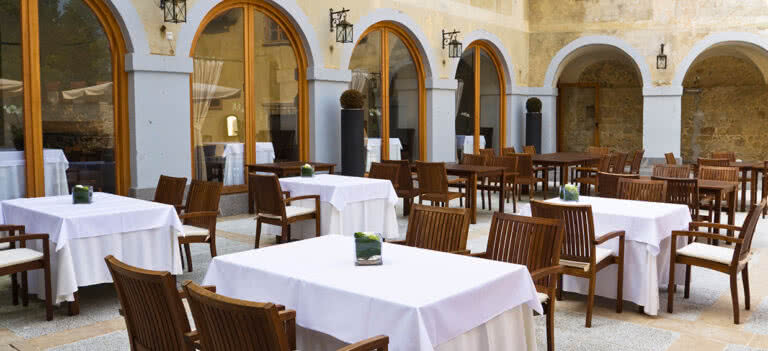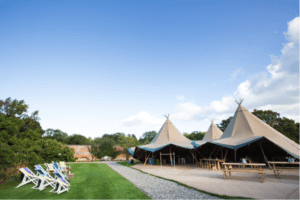While plenty of venues provide everything that an organiser could require to host an amazing event, there’s also a lot to be said for hiring a blank canvas and adding your own individual flourishes. Find out what approach works for you with our guide to dry hire venues.
When you want an extra level of flexibility and freedom, it’s worth hiring a dry venue. But what exactly does this term mean, and what are the pros and cons you need to know in order to make an informed decision?
What is a dry hire venue?
When it comes to securing a venue for your event, you might have heard the term ‘dry hire’ being used. Essentially, this refers to the practice of only paying for use of the space and providing everything else the venue needs in order to host an event yourself. This means identifying, negotiating with, and securing a whole range of suppliers – from caterers and decorators to audio-visual equipment and furniture hire companies.
Of course, plenty of venues come with all these third-party services in place and, for that reason, are commonly referred to as ‘wet hire’ venues. A wet hire venue will give organisers access to tried-and-tested suppliers, but won’t provide the kind of blank canvas some planners crave – especially if they’re looking to add a personal touch or follow a very specific theme.
As you navigate the differences between dry hire and wet hire, you’ll start to compile a list of questions that will come in handy, as each venue will have their own rules. For example, some might require you use their staff even if you plan to supply your own caterer. Others might stipulate that using their furniture is the only option available to you. You will also need to think carefully about your budget, as dry hire can come with costs you might not have accounted for.
If you are keen to organise various elements of your event independently of the venue, then dry hire is definitely an option worth exploring – here are the advantages and disadvantages you need to be aware of.
The advantages of a dry hire venue
One of the biggest advantages of dry hire is the huge amount of choice that it affords event planners. If you are only hiring the space, there’s the opportunity to decorate it however you wish and serve whatever food and drinks you want without being beholden to an approved list of suppliers that you would find at a wet venue. This gives organisers the chance to create a truly bespoke event and introduce creative and quirky elements that might otherwise have not been possible.
Keeping costs to a minimum can be another advantage but isn’t always guaranteed. The idea is that, if you are only paying to use the venue, you have the chance to take control of the suppliers you engage and therefore reduce your overheads. For example, if you have managed to secure a sponsor for your event, they could provide some of the equipment that might have been included with a wet hire venue. There are plenty of other ways the flexibility of a dry hire venue could help you keep within budget – instead of paying for staff you might be able to outsource some tasks to family members, or perhaps you have a friend with a singing / bartending / face-painting side hustle.
The disadvantages of a dry hire venue
While some event organisers thrive on the opportunity to source their own vendors, others see this as one more task to add to their ever-growing list of things to do. Establishing relationships, coordinating multiple suppliers, keeping track of timelines and negotiating costs can be an extra headache that first-time and less experienced event organisers could do without.
With a wet hire venue, you can rest assured that the venue is relying on a group of suppliers who are used to working together and have an excellent knowledge of the space. They will have handled any issues that have arisen in the past and will, therefore, be able to ensure everything goes as smoothly as possible – which might not always be the case when suppliers are unfamiliar with a venue. Serious problems – in terms of logistics and your budget – can arise if it turns out a dry hire venue has restrictions in place that could hinder the event you have planned.
In addition, a dry venue isn’t always the cheaper option. Some venues with in-house catering could charge significantly more when operating as a dry hire, because they will need to cover the lost revenue that would otherwise have been gained from catering spend.
Pro tips: Getting the right dry hire venue
As you think about whether a dry hire venue is right for your event, these tips can help guide your decision-making process:
Understand the type of event you want to organise
From the outset, it’s so important to have a clear idea of what you want your event to entail and all the elements that are involved in making it a success. Only then will you be able to assess whether a venue – whether it’s for dry hire or wet hire – is suitable. If a venue can’t accommodate all your requirements, you need to find this out before signing any agreements, as changing the venue at a later date could be very expensive.
Go into every detail when discussing the venue
Get to know the venue by arranging an on-site meeting and asking for a tour of the space. As you walk around, you’ll be able to identify any potential problems while discussing your plans for each area. This is the best way to find out instantly if your vision is realistic or if you need to rethink your initial ideas.
Compile a list of what’s included with the venue
Some venues will have a detailed document that answers many frequently asked questions and includes a list of suppliers and equipment that you’ll be able to use. But just in case, it’s worth going through these considerations carefully with your contact at the venue:
- Which spaces and facilities are included?
- What furniture and equipment is included? Just because you see something during your walk-through it doesn’t mean it’s a permanent fixture – it might have been hired by another organiser for an upcoming event.
- Will you or the venue take responsibility for supplying linen, cutlery, service staff, kitchen porters?
- What other members of staff will be available during the event – cloakroom attendants, security guards, managers and so on.
- What kitchen space and cookery equipment will be available and what time will you gain access to these facilities on the day (or in the lead up) to the event?
- How far in advance will you have access to the venue in order to decorate it?
Finding a venue for your event can be a challenge, especially if you’re working with a limited budget or have specific requirements. That’s why we have compiled a complete guide to finding an event venue that matches your needs perfectly.





